4 Dec 2014 | Academic Freedom, Europe and Central Asia, News and features, United Kingdom

(Illustration: Shutterstock)
Who decides what is acceptable behaviour? And what is not? What is mainstream and what is radical? Who can speak and who must be silent?
At the moment, British authorities have found themselves engaged in a frenzy of defining what is acceptable and what is not, well beyond the bounds of the law courts. The government’s new counter terror bill has put the onus on public bodies to prevent individuals from becoming radicalised. The measure is clearly aimed at university campuses, which have come under increased scrutiny due to the unchecked presence of organisations such as Hizb Ut Tahrir, a group that has been calling for the rejection of secular democracy in favour of an Islamic Caliphate long before it was popular.
There is no legal sanction for failure to perform this duty, but the vagueness of the proposed law should worry everyone: there is no attempt to define what “radicalism” might mean. In the days before the UK took Islamism seriously, animal rights radicals were seen as a threat to peace. Before that, Irish republicans, and so on. As recent revelations on police surveillance have shown, everyone from activists to comedians to bereaved mothers can be cast as potential enemies of the state.
A recent example should give us pause for thought. Former English Defence League leader Tommy Robinson spoke at Oxford Union on 26 November. Robinson, currently on licenced release from prison, claimed at the beginning of the talk that he had been warned by police that there were certain things he could not say, lest he find himself back behind bars. Not, apparently, issues that could, for example, have constituted contempt of court, or the other limitations most of British society accepts. Merely opinions.
This is bad enough, but with the new counter-terror measures, could university authorities have put pressure on the union not to host their speaker of choice at all? (You may say the union is independent of the university, but it still has the power to sanction students).
What does this matter to you? You are not Tommy Robinson, and you may not even think he should be allowed to speak at the Oxford Union, or anywhere. You believe Tommy Robinson is a bigot, and plain wrong, so what’s the problem?
But think for a moment.
You’re a good person, aren’t you? I mean, at least you try to be a good person, I’m sure. You’d never throw your sandwich wrapper out of the car window. You certainly wouldn’t steal, or cheat at board games.
And you’re definitely not a bigot. You might, at certain times, find yourself applying certain stereotypes to the people you see around yourself, but your internal Jiminy Cricket, or whatever Disney avatar keeps you in line, will soon correct that. You might every so often laugh at jokes about people of other races or religions, but that’s because you understand the context. You can laugh at these things precisely because you are not bigoted: you are laughing at racism, not with it.
You might, occasionally, get frustrated at the apparently new-fangled language of online social justice activists, but you realise this is probably your fault more than theirs. You’re all right.
What if you’re not, though? What if you woke up one day, the world had tilted 180 degrees, it was summer when it was supposed to be snowing, and you were all wrong? About everything. Puppies are there to be poked, pensioners exist solely to be mugged by those younger and fitter than them, and overt, aggressive racism is not just condoned but encouraged.
This is not to suggest a moral equivalence between racism and anti-racism, or political correctness and bigotry. Because there is none. Not being a bigot is clearly better than being a bigot.
But it is a useful, simple thought experiment to carry out whenever one is tempted to excuse censorship, or even support it: what if my apparently good, apparently sensible positions were the one seen as utterly beyond the pale, and those of the person who is now being censored were the ones that held sway?
It is perhaps a refusal to recognise this idea that leads to the often-used phrase, “this isn’t a free speech issue”. Shutting down a debate on a university campus? Not a free speech issue, but about safe spaces. Calling for a television programme to be cancelled? Not about free speech, but about appropriate channels for expression.
Anti-censorship campaigners are often portrayed as “free speech fundamentalists”, but in fact, a genuine sense of doubt is what should motivate all defences of free speech. You have to ask yourself time and time again: what if I was seen as completely wrong? Would it be better to have a society where people argued against me, however vehemently and vigorously? Or would I prefer a society where the government, the police and the courts were entitled to decide what I should and should not say?
This article was posted on Dec 4, 2014 at indexoncensorship.org
29 Nov 2013 | Academic Freedom, News and features, United Kingdom
In bid to address the issues surrounding people with extremist views giving talks at British campuses, Universities UK recently released new guidelines on external speakers. “Universities have to balance their obligation to secure free speech with their duties to ensure that the law is observed — which includes promoting good campus relations and maintaining the safety and security of staff, students and visitors,” says the body, which represents vice-chancellors.
This is not the first time they have spoken out about the topic. However, a set of guidelines from 2011 reads: “It is the law alone which can set restrictions on freedom of speech and expression and on academic freedom — it is for the law and not for institutions or individuals within institutions to set the boundaries on the legitimate exercise of those rights”. It appears they are calling for somewhat stricter regulation this time around. The current guidelines are also more in line with the view of the National Union of Students, which maintains that “(…) many students’ unions may wish to go further than the law on securing ‘freedom from harm’ when restricting some speaker activity.” The NUS’ own “No Platform” policy, banning certain speakers from their events, puts this theory into practice.
This is one of those topics that seems to come up at fairly regular intervals, and the outline of the debate is familiar by now. One side argues that speakers with outwardly hateful or discriminatory views don’t deserve a platform through which to legitimate them; while the other side argues that to deny them this is to deny them the right to freedom of expression, which also extends to those with whom we disagree. The following speakers have been responsible for at one point reigniting the debate, each in their own way.
1) Nick Griffin
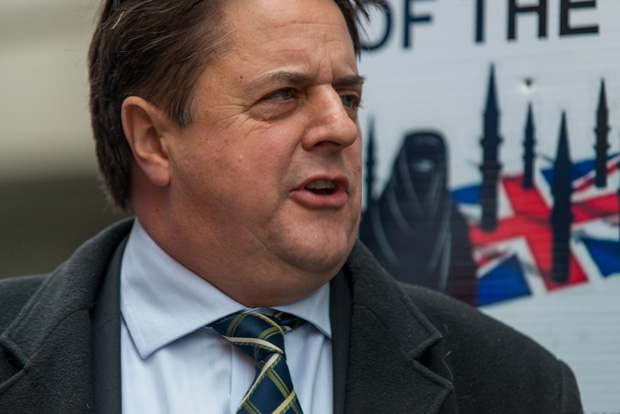
Nick Griffin outside the Old Bailey court on the first day of the trial of the murder of Lee Rigby (Image: Velar Grant/Demotix)
The most famous case in recent years was the 2007 appearance of BNP leader Nick Griffin (and Holocaust-denying historian David Irving) at an Oxford Union debate on free speech. The invitation caused massive uproar, with protesters picketing the event. “It is not just an Oxford issue, this will have ramifications for other places where the BNP are active… this is going to give legitimacy and credibility to their views,” said Student Union President Martin McClusky at the time. “I find the views of the BNP and David Irving awful and abhorrent but my members agreed that the best way to beat extremism is through debate,” argued Oxford Union president Luke Tryl. This is not only time the Nick Griffin has caused controversy as a potential university speaker. Trinity College Dublin cancelled plans to include him in a debate immigration, saying “it could not guarantee the safety and wellbeing of staff and students”.
2) Mufti Ismail Menk

Mufti Ismail Menk giving a lecture (Image: soukISLAM/YouTube)
Islamic preacher Mufti Ismail Menk spoke at Liverpool University earlier this month. He has previously stated that gay people are “filthy” and “worse than animals”. The event was initially reported to be part of a longer tour stopping at Glasgow, Leeds, Liverpool, Leicester, Cardiff and Oxford universities. However, all except Liverpool, where he was hosted by the Islamic Society, revoked their invitation or said he had not been officially invited in the first place. Liverpool responded that it is “not the role of the university to censor people’s views”.
3) Mohamed El-Nabawy
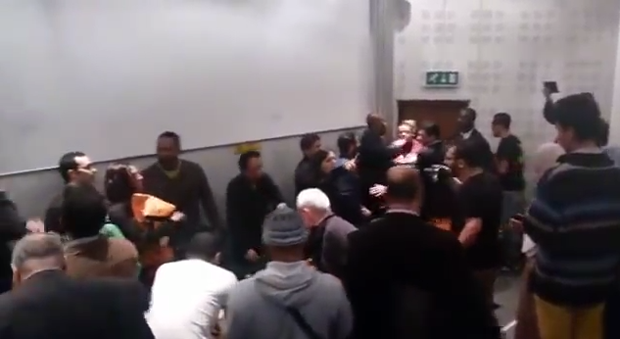
A video captured the protest that erupted when Mohamed El-Nabawy was due to speak at SOAS (Image: YouTube)
A representative of Tamaroud, the grassroots movement which played a significant role in the ousting of Egypt’s Muslim Brotherhood-backed elected government, was chased away by angry protesters prior to a scheduled talk at London’s School of Oriental and African Studies (SOAS). The protesters, who were not students, chanted and brandished posters associated with the Muslim Brotherhood at the open lecture. SOAS security had to escort El-Nabawy off campus using an emergency exit . A spokeswoman for the Palestinian Society, which had organised the talk, said: “In the pursuit of freedom of speech and expression, some people may find some of the views expressed at our events objectionable.”
4) David Gale
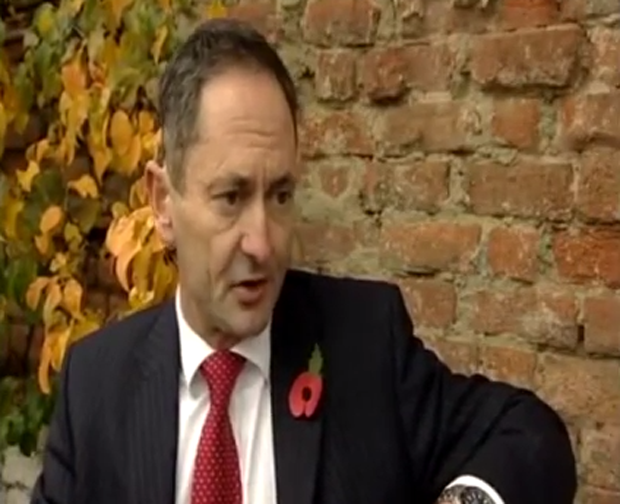
David Gale on the BBC’s Sunday Politics Show (Image: UKIPDerby/YouTube)
In 2012 the Student Union at the University of Derby banned David Gale, UKIP’s candidate for Police and Crime Commissioner, from taking part in a Q&A session at the university. The Union has a no platform policy for “individual(s) who they believe to be a member of a group with racist, fascist or extremist views”, a category the Union believed was applicable to UKIP . UKIP leader Nigel Farage weighed in on the issue at the time, saying: “It is frightening that a Derby student body is so frightened of free speech and public opinion.”
5) George Galloway
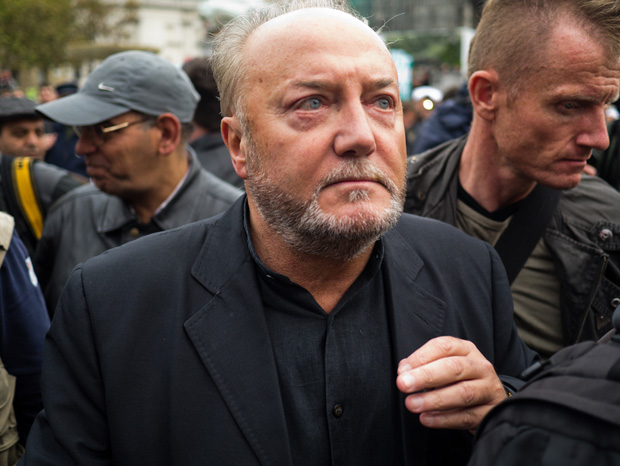
George Galloway attends an anti-war rally in 2011 (Image: Paul Soso/Demotix)
In March, George Galloway was set to speak at an event organised by the University of Chester Debating Society. However, the invitation was revoked by the Student Union, acting in line with the NUS’ No Platform policy on Galloway. This move came after the Respect Party MP was involved in a string of controversial incidents, including refusing to debate with an Israeli student at an Oxford University panel discussion. Galloway’s camp have called the policy “idiotic, anti-democratic and politically-motivated”.
6) Julie Bindel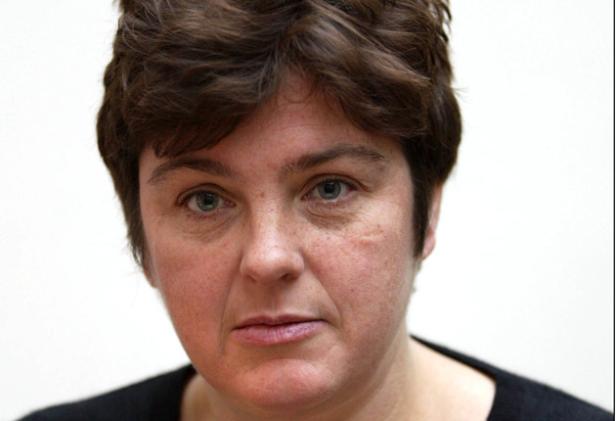
In September, the Debating Union at Manchester University (MDU) invited feminist writer and campaigner Julie Bindel to speak at their discussion on pornography. A number of people objected due to Bindel’s reported views about transexual people, which have led to the NUS implementing a No Platform policy for her. Some transexual students and their supporters “felt Julie Bindel’s transphobic statements and views made them both unwelcome at the event, and unsafe on campus, as it seemed that transphobia was being allowed and possibly encouraged,” said Loz Webb, the university’s Trans* representative. Despite this, MDU refused to replace Bindel, though she eventually chose to drop out after receiving death threats.
This article was originally posted on 29 Nov 2013 at indexoncensorship.org
17 Feb 2011 | Uncategorized
Two of Britain’s leading universities have again found themselves embroiled in free speech debates. The Oxford Union courted controversy last Friday when it allowed banned preacher Dr Zakir Naik to address the society via video-link. LSE’s German Society has provoked similar outcry by inviting far right banker Thilo Sarrazin and author Henryk Broder to speak on Monday. Fortunately, free speech has triumphed in each case.
A letter signed by over a hundred UK-based German academics and students objected to the LSE’s choice of panellists. One of their primary concerns is the speakers’ argument that “there exists a pathological unwillingness among minorities in Germany (in particular Muslims) to integrate into society”.
But there is a case for Sarrazin and Broder’s participation. If their opinions are expressed, there will be an opportunity for the other side to provide evidence to the contrary, and so to “correct” this impression. Suppressing this argument could suggest that it is an unpalatable truth to which there is no adequate rebuttal.
The controversy is reminicsent of the Griffin and Irving debate in 2007. The Oxford Union invited BNP chairman Nick Griffin and holocaust denier David Irving to speak. The Union building was overwhelmed by protestors — despite concerns that giving these figures a platform would “give legitimacy and credibility to their views”.
Ignoring these views is not an option. As abhorrent as they may be to many, they are more threatening when they are unknown. Open debate is the only effective way to illuminate the issues. Without such clarification we are poorly placed to combat them.
These are matters of public interest and they should not be concealed, regardless of the sensibilities they may offend. As the LSE Free Speech Group remarked, “the likelihood that offence would be caused was not in itself a reason to prevent the event from going ahead.”
Former UK Prime Minister Harold Macmillan described the Oxford Union as “the last bastion of free speech in the Western world”. The Society was “founded on an ideal of the Freedom of Speech”. It would be insupportable for the Union to compromise this principle, even in the face of such vigorous protest.
Unfortunately, that is exactly what happened in the Chris Langham affair. British comedian Chris Langham had been scheduled to address the Union on his arrest for downloading child pornography. Fearing a reaction on the scale of the Griffin and Irving protests, the Oxford Union cancelled the event.
22 Nov 2007 | Comment

The row over whether David Irving and Nick Griffin should speak at the Oxford Union is not an argument about freedom of speech, writes Padraig Reidy
“Hello. I’m calling from Index on Censorship, and I’d like to come along to your Free Speech Forum next Monday. Can I put my name down?”
“Hmm. You’ll have to wait til Monday.”
“Why’s that?”
“They’re having a poll on Friday.”
“On whether it should go ahead?”
“Yes.”
“I’ll keep an eye out for the result then.”
I’d imagine the Oxford Union has had a lot of calls like this in the last few days. The press loves a freak show, and Union president Luke Tryl has, to be fair, brought us a classic: why not get some nasty people, with pretty controversial views, to come and speak, under the banner of free speech. Few things get us going more than the far right, free speech, and posh kids. The posh kids bit may seem insignificant, but it actually counts here: consider the amount of newspaper coverage given to the Clareification publication of a Muhammad cartoon, and the amount given to Cardiff University’s gair rhydd‘s publication of the same cartoon: the nation’s press enjoys stories about the Oxbridge elite from which so many of its writers have come. Narcissism? Nepotism? I couldn’t possibly comment.
(more…)








